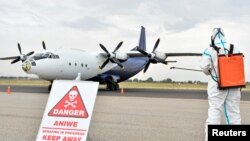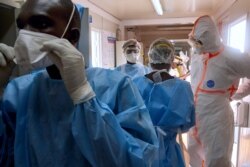South Sudan’s health ministry is warning there could be a full-blown outbreak of coronavirus in the country, as some COVID-19 patients are refusing to cooperate with health workers. COVID-19 is the illness triggered by the coronavirus.
Doctor Thuou Loi, spokesperson for South Sudan’s health ministry, told reporters in Juba on Sunday that the public must practice social distancing and cooperate with officials to control the spread of the virus or things could become much worse.
“Prevent functions that bring crowds together, consistently wash your hands, and avoid handshaking; if we don’t do that then we will have full-blown COVID-19 in the country,” Loi said.
Last weekend, the country's COVID-19 task force reported 36 new cases, bringing the nationwide total to 156. The virus has spread from the capital, Juba, to the cities of Yei and Rubkona and the disputed Abyei region along the Sudan-South Sudan border.
Dr. Mathew Tut, deputy incident manager for South Sudan’s COVID-19 task force, said laboratory technicians are able to test only 500 samples per week, which he said hampers efforts to prevent the spread of the virus.
More worrisome, only 18 of the country’s 156 confirmed cases are being managed at an isolation center, according to Tut.
Some patients have refused to cooperate with health officials, making contact tracing very difficult, according to Dr. Joseph Wamala, the WHO’s emergency response officer in South Sudan. He said their reluctance to help with contact tracing means the virus can spread uninterrupted.
“The big threat they pose is to their immediate family members ... to their immediate family, friends but also to the community,” Wamala told South Sudan in Focus.
He said people need to take the pandemic seriously, “because COVID-19 is non-forgiving. When it strikes, it strikes hard.”
As the number of COVID-19 cases rises in South Sudan, Loi said the task force will work with outside agencies to fight the spread of the disease.
“We will definitely need other actors to come on board in terms of taking care of other elements that are outside the scope of the Ministry of Health or the health sector; feeding and taking care of those patients for example, whether they are in quarantine and whether they are asked to be in isolation in their homes,” Loi told VOA.
Despite the growing number of cases, the task force last week decided to lift some COVID-19 restrictions, including allowing restaurants and bars to reopen in Juba.
A previous version of this article misspelled the first name of Thuou Loi and gave an imprecise location specifying the areas to which the coronavirus had spread. VOA regrets the errors.








